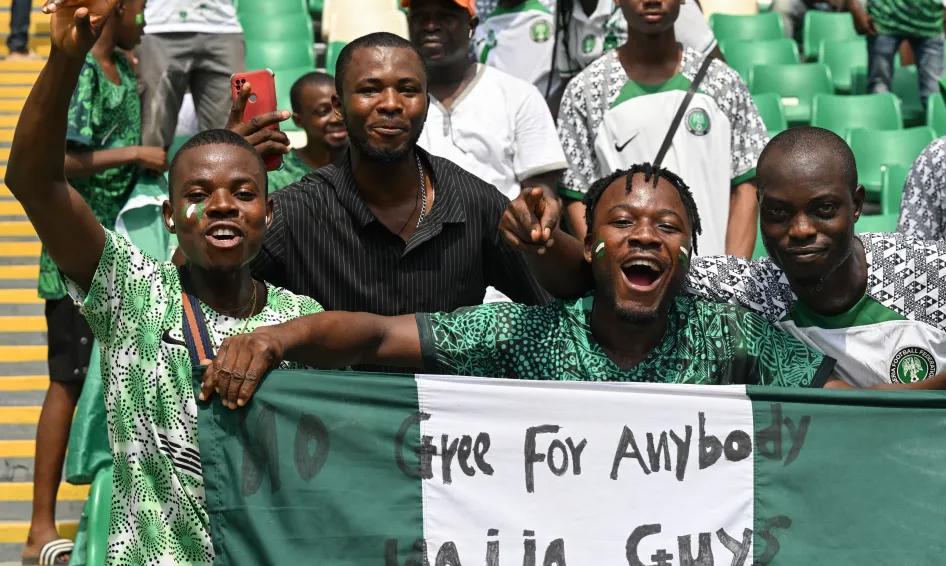When Kelechi Iheanacho picked up the ball in preparation to take his spot kick in Nigeria’s semi-final game against the Bafana Bafana of South Africa, Toriola Bamidele closed her eyes and gripped tightly the plastic chair she was sitting on outside the bar near her house in Ilorin, Kwara State, in central Nigeria.
“I was tense,” she said, laughing. “I was praying to God and confessing my sins,” she burst out laughing again.
After the ball hit the back of the net, sending Nigeria to their first AFCON final in more than a decade, cheers erupted everywhere. Bamidele jumped on an older man nearby, then ran into the street, where other football fans were gathered shouting “Up Nigeria! Up Nigeria!.”
“It was one of the happiest moments of my life,” the student of one of Nigeria’s premier universities said, adding that it was the first time since the 2023 general elections that she had felt proud of being Nigerian. “This tournament has reawakened my belief in this country, and that things can work with the right people in the right places.”
A divisive election
On May 28 last year, Bola Tinubu, a former Governor of Nigeria’s commercial capital, Lagos, and a kingmaker in his South West region, was sworn in as president after an election many considered one of the most divisive since the return of democracy in 1999.
Ethnic and religious divisions, exacerbated by the actions of political and religious elites, threatened to push Nigeria towards national collapse, with leading parties exploiting these sentiments for electoral gain. Also, some religious leaders framed the presidential election as a battle between good and evil. Even during the polls, there were claims that certain individuals were prevented from voting because they looked like a certain tribe.
On social media, voters were divided into Obidients – who supported the soft-spoken Peter Obi, an Igbo businessman and former governor of Anambra State, running under the umbrella of the Labour Party; Batists – supporters of Bola Ahmed Tinubu; and Atikulates – supporters of a perennial contestant and former vice-president between 1999 and 2007, Alhaji Atiku Abubakar.
For first-time voters like Bamidele – more than 10 million young people registered to vote – the election was an opportunity to assert themselves and make a decision for their future. “For me, it was that I didn’t like what I saw in the last administration and rewarding the ruling party with my vote was not an option,” she said.
Even as they campaigned on the mantra of “Change,” the ruling All Progressive Party (APC) administration under former president Muhammadu Buhari saw rising inflation and the country diving into multiple recessions, with millions thrown into poverty.
Although she is not a member of any political party, Bamidele said she used every opportunity she had to advocate for her candidate, Peter Obi.
“Things got worse under the APC, and the elections were an opportunity for us to turn things around,” she said but added that the other parties soon used ethnic and religious rhetoric to sow discord among the youths.
Bamidele said she fell out with some of her friends. “It wasn’t anything serious; it was just that every meeting was like a confrontation. We couldn’t talk about anything other than politics, and we just drifted apart.”
AFCON that unites
Nigeria’s journey to the AFCON final has not been easy in a tournament filled with drama. Africa’s largest country scraped a one-all draw with Equatorial Guinea in their first group game. A one-nil victory over hosts Ivory Coast and another scrappy one-nil win over Guinea Bissau sent the Super Eagles into the knockout stage. There, they defeated Angola to set up a tense semi-final battle with South Africa, which they won on penalties.
Just like last year’s election, this is also Bamidele’s first time watching the African Cup of Nations. “I didn’t have that much interest in football, but it became the only thing people were talking about on their statuses, and so I got sold the dream.”
According to Bamidele, unlike politics, football allows for unity and brings people together. “When we were all watching the match, nobody cared about who was Igbo, Yoruba, or Okun. Neither did anyone care about being a Christian or Muslim. It was just our love for our country,” she said.
For Bamidele, Nigeria’s journey towards the AFCON final is a rallying point to show that individuals can stir the Nigerian spirit. “What I have learned from all of this is that I shouldn’t let the issues of the last election define my relationship with the country,” adding that she believes that the country can be a lot better, and she will do her part in holding the government to account. “I had given up on the country, but now, I feel fuelled to do more now and even during the political season. Nigeria must work, and I am ready to play my part.”
Writers Note: Nigeria lost the AFCON final to host Ivory Coast. When I reached out to Bamidele to get her say, she laughed and said “Aluta continua.”






